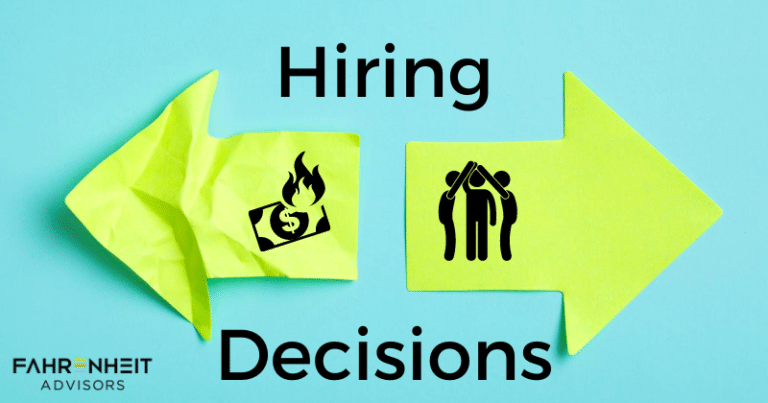Bad Hires Are Costly – 3 Ways To Make Better Hiring Decisions

Bad hires are costly. Unforeseen expenses, lost time and lost productivity have a negative impact on employee morale. Obviously, hiring the right person the first time should always be the goal for any organization. Here are three ways to help make better hiring decisions:
1) Gain internal consensus before launching your next candidate search
This is a real miss with organizations that often result in bad hiring decisions. Take the time to examine the things that made the previous person successful or unsuccessful. If this is a new position, defining the needs of the organization today and over the next several years will ultimately define the candidate profile. Before going to market, your team should all agree on what it is you are looking for and understand how you will evaluate candidates based on that need. One way to ensure alignment is by asking what you are looking for this hire to accomplish during their first year of employment? Are there certain Key Performance Objectives (KPO’s) you will use to measure success? Be sure to reflect these expectations in your position description as these will anchor your candidate evaluation and decision-making process.
2) Anchor evaluations of candidates based on key job factors
After determining what KPOs measure success, an in-depth interview process is a critical component in identifying which candidates will be most successful in the role. Be sure to create specific interview questions based on these objectives. Strong evidence includes dates/deadlines, metrics, and specific details about the candidate’s past performance doing comparable work. Debrief sessions with those making the hiring decision should focus on how the candidate performed on these questions and less on emotion.
3) Ask insightful questions to genuinely understand why the candidate wants to make a change
We all desire to find a mutually beneficial employment match that is lasting. Gaining a strong understanding of why a candidate wants this position, to work for your company, and how they plan to be successful in the role is critical to ensuring that match is lasting. If a candidate has a hard time articulating their why, then they may be making this career move for other reasons. Their response should yield specific details about the work, potential growth opportunity, leadership, and culture. If not, you may be on a path of employee and employer dissatisfaction.
The cost of a bad hire is higher than most people realize, and the negative effects may linger long after the employee takes their talents elsewhere. The more time, effort, and resources your team dedicates to the hiring process on the front-end, the better positioned you will be to hire the right candidate the first time.
At Fahrenheit, we work with hundreds of companies across all industries that come to us for our straight-forward approach and consultative guidance when it comes to finding the right talent to take their organization to the next level. Our Executive Search & Recruiting team spends extra time with our clients on the front-end of the search process to ensure we understand their strategic issues, cultural nuances, and leadership needs. Then, through competency interviews, leadership questionnaires, cultural assessments, references, and our deep market knowledge, we help our clients make the best placements for long term success.
Reach out to me so we can discuss your company’s unique talent needs- 804-955-4421, mwoodward@fahrenheitadvisors.com.
About the Author
 Megan Woodward leads the strategic recruitment of executive and professional level roles in accounting and finance, human resources, operations, and sales and business development. She is adept in managing the entire talent acquisition process from initial discussions identifying the role to marketing, sourcing, and screening candidates, scheduling interviews, and negotiating and closing the position. Fahrenheit’s unique recruiting approach allows her to customize each search based on an understanding of a client’s business, industry, and culture as well as the interests and experience of individuals within an established network of qualified candidates.
Megan Woodward leads the strategic recruitment of executive and professional level roles in accounting and finance, human resources, operations, and sales and business development. She is adept in managing the entire talent acquisition process from initial discussions identifying the role to marketing, sourcing, and screening candidates, scheduling interviews, and negotiating and closing the position. Fahrenheit’s unique recruiting approach allows her to customize each search based on an understanding of a client’s business, industry, and culture as well as the interests and experience of individuals within an established network of qualified candidates.